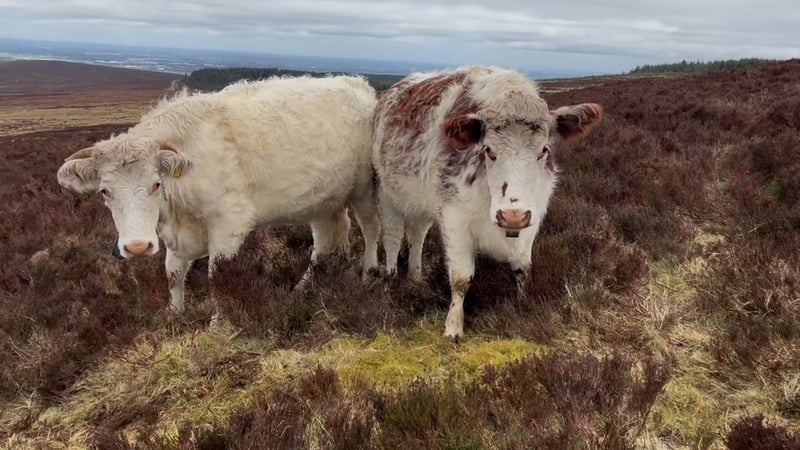The Department of Agriculture has said progress is being made to clear a backlog of payments due to farmers under the Agri-Climate Rural Environment Scheme (ACRES) climate initiative that incentivises them to improve biodiversity on their lands.
The Government-run scheme has a fund of €1.5 billion to help address biodiversity decline on farms, focusing on things like planting new hedgerows, native trees, and protecting watercourses.
Over 50,000 farmers have signed up for the scheme since it began in 2023.
But more than 9,000 farmers are waiting for 2024 payments, with 2,300 of them also awaiting payments for 2023.
IT failures, a lack of staffing in the Department of Agriculture, as well as huge demand for the scheme are being blamed for the delayed payments.

The Irish Farmers' Association (IFA) said the delays are causing huge hardship to farmers who rely on the funding to stay in business.
IFA President Francie Gorman said he thinks Minister for Agriculture Martin Heydon could "sort this problem in the morning - like his predecessor Charlie McConalogue - by pressing the button and making an upfront payment to farmers who are due these payments.
"Farmers have invested very heavily in this scheme since 2023 and we have thousands of farmers now who haven't got their balancing payments for 2023 - or their advanced payments for 2024 - and it's causing huge cash-flow problems on farms.
"People would have invested in the measures, whether it be hedgerows or whatever, they would have hired consultants to draw up their plans, they have to be paid.
"Households have to be run as well and those payments are due to farmers now. A lot of those farmers would have no stock to sell at this time of the year, so they're dependent on that for cash flow - not just to run their farm but their household."
We need your consent to load this rte-player contentWe use rte-player to manage extra content that can set cookies on your device and collect data about your activity. Please review their details and accept them to load the content.Manage Preferences
Mr Gorman added that ACRES is Ireland's "flagship agri-environment scheme over the course of the five years (2023-2027), there's €1.5 billion in it. To think that that amount of money is in that scheme and it has become a bad news story for everybody involved beggars belief".
The Department of Agriculture said that "real progress has been made" since Minister Heydon assumed office in January, with just over €21 million, more than a third of the outstanding payments, cleared and paid.

In a statement, the department added that Minister Heydon "recognises the frustration and difficulty for farmers who remain to be paid".
"Regular payment runs continue to be made on the contracts awaiting final payment in respect of 2023 and/or advance payment in respect of 2024, with the vast majority of cases to be resolved before balancing payments issue in May, and the most complex cases finalised in June at the latest."
Farmer Myles Murphy has a handful of cattle grazing in the Dublin mountains. They eat vegetation, helping biodiversity and reducing the risk of wildfires.
Under a previous environmental scheme, he got funding for virtual fencing. For his cattle to graze it's expensive and tricky getting cattle up on the hills - and trickier still keeping them there.
"It's not fenced in here, it's open roads," he explains.
"The roads are open both to Tallaght and to Rathfarnham, so controlling the animals on the mountains is a real difficulty. They have collars on their necks and we control it by an app on the phone. We create virtual pastures on the mountain and the animals will stay within that pasture."
This technology gives the cows a warning and ultimately a mild shock if they attempt to leave the virtual zone.
Mr Murphy wants to graze more cattle and has applied for funding to do so under ACRES.
While nearby, in a field where his new ewes are finding their feet, he has started an orchard with ACRES support.
The orchard, and projects like it, are assessed by Fergal Monaghan, Director of the ACRES programme for the region.
"Our job is to support farmers, farm advisors and the Department with the rollout of the ACRES scheme," he said.

"Farmers in ACRES have applied for over 80,000 actions on farms. Orchards like this are one of them. In our area we've over 500 orchards that have been approved in the last two years.
"There are a couple of big benefits from the orchard. One is it preserves traditional apple varieties that developed all over Ireland and are easily lost through commercial varieties sold through garden centres.
"In addition, an orchard is a useful habitat for a wide range of pollinators and provides nest sites and food for a large number of small birds."
There is a full ACRES project team around the country helping farmers to secure funding for projects.
Deputy Project Manager for ACRES Leinster Brian Dunne said that when assessing land, they are "looking at the ecological integrity, the hydrological integrity, and any threats or pressures to that".
"So that might be something like invasive species such as Sitka spruce - they have a drying impact on a peatland, so we want to see farmers cutting those conifers.
"If they have maybe rhododendron, that's another invasive species we look at getting removed," he said.
The ACRES teams also look at places that might be damaged from dumping and can help with the removal of rubbish.





